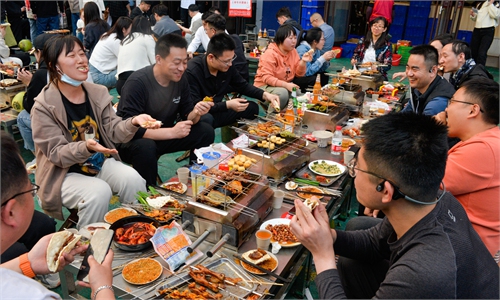ARTS / CULTURE & LEISURE
Popular Zibo barbecue epitome of Chinese strive for excellence

Illustration: Hang Dachuan/Global Times
The local government of Zibo, East China's Shandong Province, has issued two open letters in a short time to all citizens, extending its gratitude for their warmth and hospitality toward visitors who have come to enjoy the city's signature barbecue, which has recently become a hit across the country. Such an unexpected success has shown the city's spirit of unity and tenacity, which will surely further boost its tourism and economic development.
Since early March, Zibo local barbecue caused a sensation online. The little double-layer stove, small pancakes, green onions and sauce became icons among netizens. According to reports, Zibo received 4.8 million visitors in March, a year-on-year increase of 134 percent, and tourist revenue was up by 60 percent. A total of 1,288 barbecue businesses served 135,800 customers a day on average, most of whom were university students from across the province and nationwide.
According to a CCTV-2 report, many hotels in Zibo have been fully booked ahead of the May Day holidays, with reservations rising by 800 percent from 2019, ranking first in Shandong Province. Zibo's booming tourism has become a highlight of China's tourist market in 2023.
For a long time, Zibo was a "mediocre" city in almost all aspects on the Chinese scale. However, "taking the high-speed train to taste barbecue in Zibo" miraculously became a trending hashtag for this non-traditional tourist city. But how did Zibo rise to fame? This has not been some random coincidence.
First, it comes down to the ambition, determination and creativity of the city government. From July 2022 to February 2023, Zibo organized many trips to the city for university students. When the number of visits reached its peak, it did not panic but soon put forward several supportive policies, such as setting up a "Golden Stove Award," establishing a barbecue association, making a map of Zibo barbecue restaurants, and opening 21 fixed tourist routes in addition to barbecue. It also recruited many volunteers to guide tourists, and appointed personnel to ensure public safety.
Second, Zibo's sudden boom in popularity also resulted from the post-pandemic tourism revival China has experienced. What is different is that the city aims to both revitalize its tourist industry and promote its long-term development. To this end, it provided young people, especially university students, with convenient services and created a welcoming atmosphere. For instance, non-Zibo students can enjoy free stays three times a year for two nights each time at youth inns. It extended invitations to students including those of distinguished universities to visit Zibo for free, a sign showing its thirst for talented young people.
As Ma Xiaolei, Party secretary of Zibo, said, "I believe there will be two-way exchanges between young students in our city, and Zibo will have a brighter future."
Media reports suggested that at least 120,000 people from Beijing alone are expected to visit Zibo by train during the May Day holiday. This influx of tourists will present a significant challenge to the city's capacity so the letters from the Zibo government came just in time.
Zibo can be seen as an epitome of the whole country for their aspiration to do business and seek development opportunities. With the determination of its government and concerted efforts of its citizens, this conventional heavy industrial city is making every effort to grasp the tourism opportunity and flourish.



